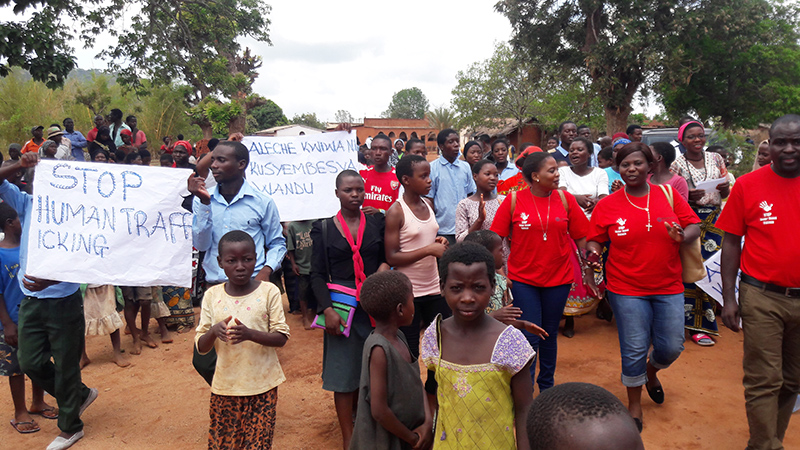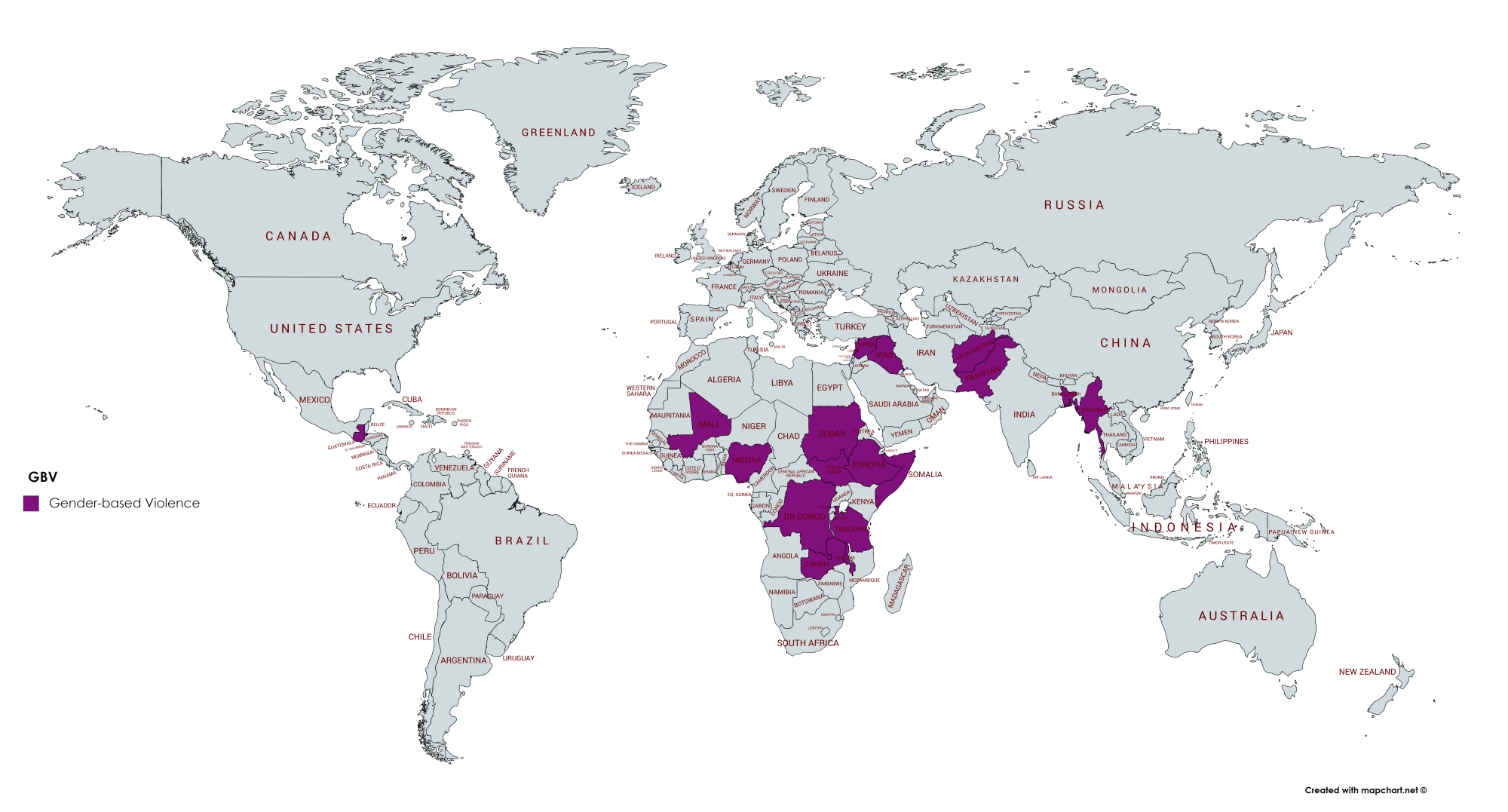Results case
Trafficking law to end violence on women and girls in Malawi
Prior to March 2015, Malawi did not have a human trafficking law in place and was rated a tier 2 country in the Trafficking Victims Protection Act (TVPA)8.

Violence against women and girls is one of the most widespread, persistent and devastating human rights violations in the world today. GBV knows no social, economic or national boundaries, and increases drastically during conflict and other humanitarian crises. NCA works on prevention and response to gender-based violence, and the links to sexual and reproductive health and rights (SRHR).
![]()
![]()
![]()
![]()
![]()
![]()
It is estimated that 35% of all women worldwide will experience physical or sexual abuse in their lifetime. One out of three girls aged 15-19 was subjected to female genital mutilation/cutting (FGM/C) in 2018, with prevalence rates much higher in some countries NCA works in. 1 in 5 girls, or 23 girls every minute, are married before they turn 18, and fragile states have the highest rates of child marriages due to increased insecurity, poverty and weakened social networks.
All forms of gender-based violence undermine the health, dignity, security and autonomy of its victims, yet it remains shrouded in a culture of silence. Survivors of violence can suffer sexual and reproductive health consequences, including forced and unwanted pregnancies, unsafe abortions, traumatic fistula, sexually transmitted infections including HIV, and even death.
Maternal mortality is unacceptably high. Almost all these deaths occur in low resource settings, and most could have been prevented.
Unequal power between women and men is the root cause of GBV and gender inequality, which results in oppression of women and girls. Gender inequality exists in individual relationships between men and women and in, and is reinforced by, political, economic and social systems, practices and institutions; so-called ‘structural’ inequality. Inter-personal violence is underpinned and exacerbated by structural violence.
Armed conflict causes horrendous suffering, and in most instances, it changes community structures, economic roles and social dynamics, which may affect women and girls’ equality, safety and dignity. Harmful practices and norms which existed prior to the crisis may increase due to displacement, increased protection concerns and lack of livelihood.
Gender discrimination is not only a cause of many forms of violence against women and girls but also contributes to the widespread acceptance and invisibility of such violence – so that perpetrators are not held accountable, and survivors are discouraged from speaking out and accessing support.
The goal of NCA’s gender-based violence (GBV) programme is for women and girls to live empowered lives free from GBV. Within this programme, NCA and its partners aim to
• transform dominant norms to protect girls and women from violence and harmful practices
• provide access to life saving and specialised GBV services for survivors and women and girls at risk of violence
• empower women and adolescent girls to lead, build self-esteem and realise their rights
• reduce maternal mortality among women and adolescent girls
• promote access to comprehensive sexuality education and modern family planning for women and adolescents
In line with NCA’s commitments made at the World Humanitarian Summit, NCA’s GBV programme has a strong connection between development, humanitarian and advocacy work through collective outcomes.
GBV in Humanitarian Response
While providing humanitarian assistance to people affected by armed conflicts and other disasters, NCA takes the opportunity to also work to prevent and respond to inequality, GBV issues and harmful practices. Humanitarian interventions focused on shifting harmful practices concentrate on preventing practices that are exaggerated during conflict, displacement and disasters. These include early child marriages, forced marriages and intimate partner violence, in addition to exploitation, abuse and trafficking in women and girls for forced prostitution. The interventions will be implemented during a shorter time span than in long-term development settings, focusing on immediate impact, involving community groups and creating a critical mass for change.
NCA’s GBV in emergencies programmes focuses on establishing a multi-sectoral response model to ensure accessible lifesaving and specialised GBV services, either through local partners and/or directly. Protection and empowerment of adolescent girls and women is an important focus for NCA during emergency response, supporting women and girls to uphold their dignity and agency. Establishing SRHR services, with attention on adolescent girls and working with the objectives under the Minimum Initial Services Package to ensure access to SRHR, is therefore given priority.
GBV in Long-Term Development Work
NCA works to close the gender gap through addressing unequal power relationships between women and men. Addressing harmful norms and harmful practices requires addressing and unpack power. NCA’s norm changing programmes walk communities systematically through a change process, to avoid a chronic cycle of awareness raising that does not lead to sustainable change. Changing norms, and maintaining the change, must include a critical mass of people across all levels of society, from religious leaders, community leaders, teachers and police to women, men, boys and girls. Our phased approach helps NCA staff, partners and community members to reflect on their own lives and relationships before trying to influence others. NCA works with faith actors through dialogue, engaging them on theological reflections, national level advocacy, integrating issues of harmful practices in their teachings and mobilising their constituencies for change of social norms, both within the congregations and the wider communities. This important work takes place in both rural and urban areas. To ensure specialised services for survivors of GBV, NCA focuses on strengthening existing services, including local government and/or local civil society and faith structures.
Within the SRHR agenda, NCA supports better access to family planning services, allowing individuals to achieve desired birth spacing and family size. This also contributes to improved health of infants, children, women and families. Increased use of comprehensive sexuality education in schools and elsewhere is also prioritised. NCA’s contribution to the maternal mortality agenda is to work for integrated management of pregnancy and childbirth with focus on reducing the gap between the education of nurses/midwives and the practical health skills needs.
GBV and Advocacy
NCA concentrates on long term changes in political dynamics between women and men, increasing women’s agency and ability to influence political and public processes, and gain control over economic assets.
NCA and partners influence authorities in their development and implementation of legal norms, laws and regulations. Focus is on laws that prohibit harmful practices, discrimination based on sexual orientation and gender identity, and all forms of violence against women and girls. The programme advocates for structural reform, holding states accountable for providing services for its population and in line with their human rights obligations, in addition to advocating for tax funded social protection systems which address inequalities between women and men. Systems reform is also prioritised, including systems and strategies to monitor and respond when rights are breached. Intervention at this level includes developing and building the capacity of statutory and traditional legal/justice systems, healthcare systems, social welfare systems and community mechanisms.
NCA advocates for increasing the representation of women and girls when conventions, resolutions, laws and policies are discussed and approved, and for women taking up leadership positions, both within the religious sphere and more widely in society (chairpersons, Ministers, etc.). Engagement with and advocating for human rights defenders is also paramount, so too is advocating for the implementation of the Women, Peace and Security agenda, in addition to the Youth, Peace and Security agenda.
NCA will use international platforms like the UN Commission on Population and Development to work against the setback on the access and acceptance of SRHR services like modern family planning, comprehensive sexuality education and safe abortion for adolescents and women.

NCA works with faith actors, women’s groups, youth groups, local and international civil society actors, the ACT Alliance, authorities, and communities at large to promote and protect women and girls’ rights. When women and girls’ rights are promoted and protected, they can live free of violence, make decisions about their own bodies, access education and health care, attain the highest possible psychosocial wellbeing, and realise their sexual and reproductive rights.
NCA has a comparative advantage in engaging faith-based organisations and religious leaders – women and men – in efforts to reduce GBV, given their legitimacy, moral authority and outreach. NCA challenges faith-based partners and religious leaders to act against GBV, within their faith communities, in local communities and through advocacy towards duty bearers.
NCA and partners work with youth to create change among youth and a space where youth can grow and be empowered to make their own decisions about their lives. Faith actors are often the gatekeepers to social and moral norms, and the GBV programme works with faith actors to create change within congregations and communities at large.
NCA is a core member of the Global GBV AoR. It works within the cluster system to improve the effectiveness and accountability of humanitarian response for the prevention of, risk mitigation of and response to all forms of gender-based violence; ensure that the agency and capacity of survivors is recognised and reinforced; and to ensure that primary prevention efforts are effectively employed to address underlying gender inequality. NCA is also a member of the Call to Action on Protection from GBV in Emergencies, a global initiative of governments and donors, international organisations and NGOs, aiming to drive change and foster accountability from the humanitarian system to address GBV from the earliest phases of a crisis. Focusing on enhancing mental health and psychological care for GBV survivors, NCA joined the IASC Mental Health Reference Group. To foster better collaboration on reproductive health in emergencies, NCA has recently joined the Inter-Agency Working Group on Reproductive Health in Crises.
Norwegian Church Aid continually seeks to improve the quality and choice of care for GBV survivors so that they can heal from trauma, reconnect with their communities, and be agents of social change. With support from Innovation Norway, this GBV innovation project sought to explore the use of virtual reality (VR) as a medium through which therapeutic interventions can be delivered to GBV survivors. To do this, NCA engaged in an innovation-friendly procurement process, resulting in partnerships with two private sector companies—Healium and Fornix—to develop and test two VR-based psychosocial interventions in northern Iraq.
NCA has produced several resources for preventing and responding to GBV, which are available for download. Please see below for a description of the resources and download possibilities.
The resources are:
Integrating Therapeutic Interventions in GBV Case Management
ITI Peer Supervision Toolkit
Clinical Management of Rape and Intimate Partner Violence Manual
We Matter: Staff Care and Self-Care Resources
Starting the Journey to Nonviolence – A Reflective Practice with Men
FAME Toolkit